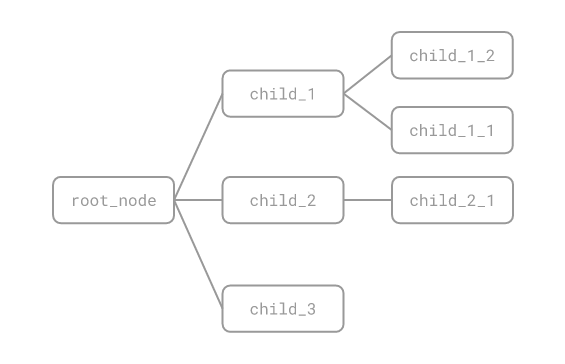1 unstable release
| 0.4.0 | Sep 24, 2021 |
|---|
#33 in #tree-traversal
Used in tref
53KB
870 lines
SOCAREL
Rust crate to generate, manipulate and traverse trees.
It provides iterators for eight different traversal algorithms.
Add and remove nodes in O(1) complexity. Find nodes in a path in O(p) complexity (being p the path lenght).
Supports custom node models to create complex tree formats.
Usage & Docs
As with any crate, generate the docs using cargo:
cargo doc --open
Crate
Download the crate at crates.io
Examples
Check out files src/main.rs and src/tests.rs for usage examples.
Name
Socarel is a catalan word composed by soca (trunk) and rel (root). It means totally, entirely, and depending on the context can be understood as pure, genuine.
lib.rs:
SOCAREL
Socarel is a library to generate, manipulate and traverse trees.
It provides iterators for eight different traversal algorithms.
Add and remove nodes in O(1) complexity. Find nodes in a path in O(p) complexity (being p the path lenght).
Supports custom node models to create complex tree formats.
Examples
To generate a tree like the following:
We would do:
use socarel::*;
let mut tree = <Tree>::new();
let _root_node = tree.set_root("root_node").unwrap();
let _child_1 = tree.link_node("child_1", _root_node).unwrap();
let _child_2 = tree.link_node("child_2", _root_node).unwrap();
let _child_3 = tree.link_node("child_3", _root_node).unwrap();
let _child_1_1 = tree.link_node("child_1_1", _child_1).unwrap();
let _child_1_2 = tree.link_node("child_1_2", _child_1).unwrap();
let _child_2_1 = tree.link_node("child_2_1", _child_2).unwrap();
Then you can store your tree in a forest:
let mut forest = <Forest>::new();
forest.add_tree("my_tree", tree);
And retrieve it later:
let tree = forest.get_tree("my_tree").unwrap();
Or iterate the forest to get all the trees:
for (tree_id, tree) in forest.iter() {
// ...
}
Editing trees
Is possible to modify a tree after being created, of course by linking more nodes as we saw previously, but also unlinking them:
let tree = forest.get_mut_tree("my_tree").unwrap();
tree.unlink_node(_child_1);
tree.unlink_node(_child_2);
After unlinking, the node is still in the array of nodes stored inside the Tree, but is not accessible anymore because it's disconnected from the rest of the tree. And any child of the unlinked node will be inaccessible too. So, after the two unlink operations the tree will have only two nodes left: root_node and child_3.
But why leaving the nodes there? We are wasting memory! Well, yes, but the alternative is recursively removing all the nodes, that can be costly and is actually unpredictable, because we don't know how many children are out there. To keep the unlink operation fast / O(1) we need to do it this way.
We can also change the content of a node without modifying the linking properties:
tree.update_node("new_root_node", _root_node);
Iterators
There are many ways to traverse a tree, that's why Socarel provides multiple iterators, each one implementing one traversal algorithm. Let's see one of the most widely used, BFS:
for (node, node_index) in tree.iterators().bfs() {
// ...
}
Check out IterInterface for the complete list of iterators.
Finding nodes
Sometimes to find a node we don't need an iterator because we know where it is in the tree structure:
let _node = tree.find_node(&["root_node", "child_1", "child_1_1"]).unwrap();
Using [Tree::find_node()] is always better when possible, because the complexity is O(p) (p = path length) while the complexity of most traversal algorithms is O(n) (n = number of nodes in the tree).
Custom Nodes
Tree contains an array of Nodes, but the node structure as is only gives information about its position in the tree, doesn't provide a way to store the content. The content is stored in another struct that implements the trait NodeContent.
Socarel provides a default implementation, RawNode, that is used whenever no other type is supplied. That's the reason of the way we created the tree and forest instances before:
let tree = <Tree>::new();
And the reason why this won't compile:
let tree = Tree::new();
Because Tree is defined with a generic that implements NodeContent, that has a default type RawNode. So we could also create a tree like this:
let tree = Tree::<RawNode>::new();
But we can also implement our own node content to model whatever we want. Imagine that we want a tree that has weights for node connections. We could define something like:
struct WeightNode {
content: String,
weight: u32
}
impl WeightNode {
fn get_weight(&self) -> u32 {
self.weight
}
}
impl NodeContent for WeightNode {
// We parse the node content and return None if not a valid format
fn new(content: &str) -> Option<Self> {
let vec: Vec<&str> = content.split(':').collect();
if vec.len() == 2 {
match vec[0].trim().parse() {
Ok(num) => Some(Self {
content: String::from(vec[1]),
weight: num
}),
Err(_) => None
}
}
else {
None
}
}
fn get_val(&self) -> &str {
&self.content
}
fn gen_content(&self) -> String {
format!("{}:{}", self.weight, self.content)
}
}
And now we can use our brand new node content in a tree:
let mut tree = Tree::<WeightNode>::new();
let _root = tree.set_root("0:my root node").unwrap();
let _node_1 = tree.link_node("10:my node 1", _root).unwrap();
let _node_1_1 = tree.link_node("100:child of my node 1", _node_1).unwrap();
for (node, _) in tree.iterators().bfs() {
let cref = node.get_content_ref();
println!("Node content = `{}` weight = {}", cref.get_val(), cref.get_weight());
}
